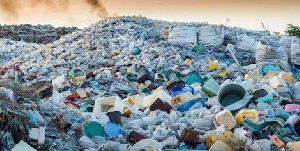- Home - News
- Elections 2024
- News Archive
- Crime & Punishment
- Politics
- Regional
- Editorial
- Health
- Ghanaians Abroad
- Tabloid
- Africa
- Religion
- Photo Archives
- Press Release
General News of Wednesday, 7 May 2025
Source: www.ghanawebbers.com
MPs reiterate calls to ban plastic materials in Ghana
Plastic Materials
Vincent Oppong Asamoah, Chairman of Parliament’s Select Committee on Works and Housing, has revived the debate on banning plastics. He cites their environmental threat and impact on flood mitigation in Accra.
During a visit to the Odawna drainage site, he expressed concern about plastic waste clogging drains. This issue hampers progress on the Greater Accra Resilient and Integrated Development (GARID) Project. “Everywhere we turned, the drains were choked with plastic waste,” he said. He emphasized that this is not just a drainage issue; it’s a national crisis.
The GARID Project is a $200 million initiative launched in 2020 with World Bank support. It aims to tackle flooding in Accra, especially in flood-prone areas along the Odaw River basin. Mr. Asamoah urged that this initiative should remain non-partisan: “This is a national project. Let’s keep politics out.”
Richard Kofi Amekor, technical head of drainage at GARID, noted that waste disposal is critical. Effective waste collection and public behavior changes are necessary to prevent pollution. He mentioned complaints from fisherfolk about declining catches due to plastic waste.
“Wherever the drains meet the sea, it’s just city waste flowing out,” Amekor stated. When asked if banning plastics would help, he said it could be part of a broader strategy. “Single-use plastics are the biggest problem,” he added.
Amekor highlighted infrastructure issues as well. The Odaw River collects water from far upstream but lacks detention capacity for heavy rains. He recalled the June 3, 2015 disaster when 137 millimeters of rain fell in six hours without causing flooding due to inadequate upstream ponds.
“We have secured two sites for detention ponds and are ready to start construction,” he said. Despite urgency, committee members questioned delays in the project’s timeline since it began in 2019.
Ranking Member Martin Agyei Mensah Korsah asked why they were still waiting for action after its effective start in 2020. GARID officials attributed delays to land acquisition and design finalization challenges, which have now been resolved.
The inspection also revealed ongoing destruction of natural flood barriers like wetlands and floodplains due to poor practices. “We have identified over 5,000 structures built within 50 meters of the Odaw,” Amekor reported.
These structures include both low-income and high-income areas. With rains approaching, committee members urged swift action on detention ponds and stricter enforcement against encroachment.
Chairman Asamoah believes long-term solutions must involve serious discussions about plastic use nationwide. “If we don’t act now, the problem will only worsen,” he warned. “The evidence is right before our eyes.”











